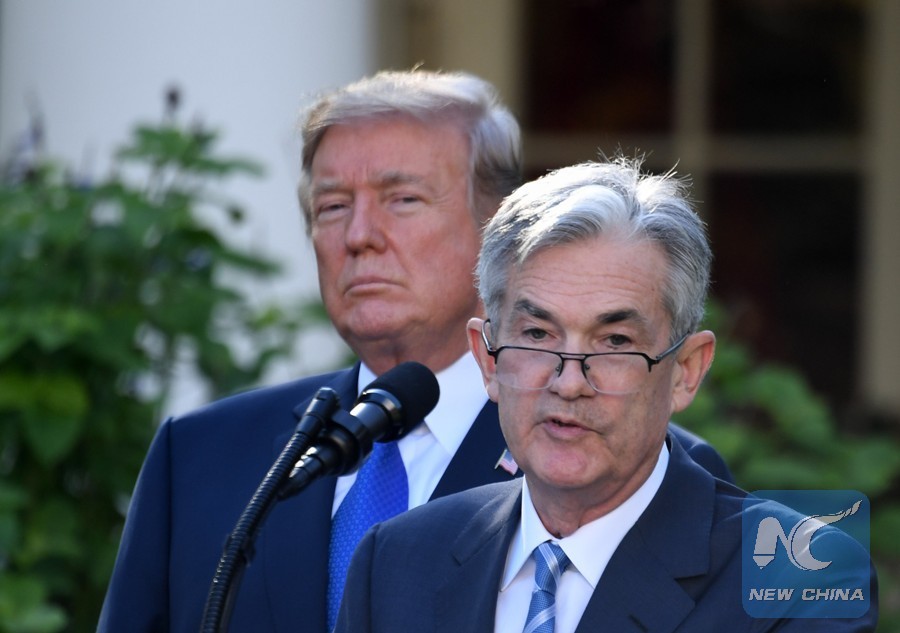
File Photo: U.S. Federal Reserve Governor Jerome Powell (R) addresses a nomination ceremony with President Donald Trump at the rose garden of the White House in Washington D.C., the United States, on Nov. 2, 2017. (Xinhua/Yin Bogu)
WASHINGTON, Jan. 18 (Xinhua) -- Stimulated by deregulation and tax cuts promises made by President Donald Trump, who took office one year ago, the U.S. economy gained steam in 2017 and the growth momentum is widely expected to continue this year.
However, concerns about the long-term outlook of the U.S. economy began to loom large, as experts worry that the tax cut bill passed in December last year could further worsen fiscal strength and external balances of the world's largest economy.
OPTIMISTIC NEAR-TERM OUTLOOK
With the Trump administration's deregulation efforts and pushes for tax cuts, business and consumer confidence remained at historic highs over the last year.
Grant Kimberley, an Iowa farmer, told Xinhua that the regulatory burden on farm families has lessened a great deal since Trump took office. Kimberley also thinks the tax cut bill will benefit agriculture.
According to data from the White House's Office of Budget and Management, the administration has eliminated, delayed or streamlined 1,579 regulatory actions since January last year.
The strong business and consumer confidence shored up business investment and consumer spending last year, which are likely to transfer into stronger economic growth.
The U.S. economy is widely expected to grow about 2.5 percent in 2017, a large improvement from the 1.5 percent growth in 2016.
This strong growth momentum is expected to continue in 2018.
William Dudley, president of the New York Federal Reserve Bank, recently raised his forecast for U.S. growth in 2018 by 0.5 to 0.75 percentage point to a range from 2.5 percent to 2.75 percent.
"About one-third of this upward revision reflects the firmer momentum of the economy going into 2018 and about two-thirds the stimulative impact of the tax legislation," said Dudley.
The World Bank also expected the tax bill to boost corporate investment because of the low corporate tax rate.
With stronger private investment, the U.S. economy is estimated to grow 2.3 percent in 2017. The growth is expected to accelerate to 2.5 percent in 2018 and then moderate to an average of 2.1 percent in 2019 and 2020.
LONG-TERM GROWTH IN SHADOW
Despite the stronger near-term growth, economists worry that the weakening U.S. fiscal strength and the government's restrictive trade orientation would cast a shadow over the long-term outlook of the U.S. economy.
Dudley named the risk of overheating and the long-term fiscal position as the two major concerns for the U.S. economy.
With the tightening of the labor market, boost from the tax bill and relatively loose financial conditions despite interest rates hikes, economic overheating is a real risk over the next few years, said Dudley.
"This suggests that the Federal Reserve may have to press harder on the brakes at some point over the next few years," said Dudley. "If that happens, the risk of a hard landing will increase," he added.
Another concern for the U.S. economy is the worsening of the U.S. fiscal strength, Dudley said.
The budget deficit was 3.5 percent of GDP in fiscal 2017, up from 1.1 percent in 2007. The figure will further grow thanks to the recently passed tax bill.
It is estimated that the tax bill will add 1 trillion U.S. dollars of budget deficit over the next 10 years.
The United States needs to get its fiscal house in order for the long run, said Dudley.
"The longer that task is deferred, the greater the risk for financial markets and the economy, and the harder it will be for the Federal Reserve to keep the economy on an even keel," he said.
The World Bank also warned that low labor participation and weak productivity trends remain the most significant drag on the U.S. growth over the longer term.

